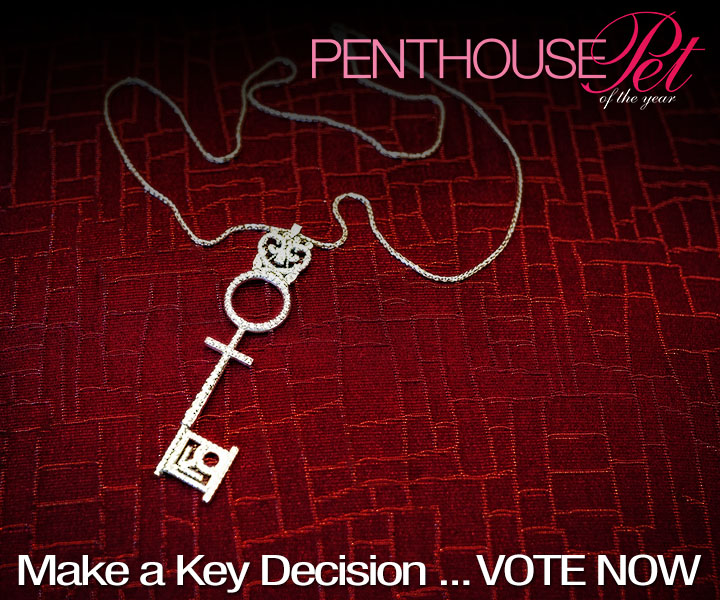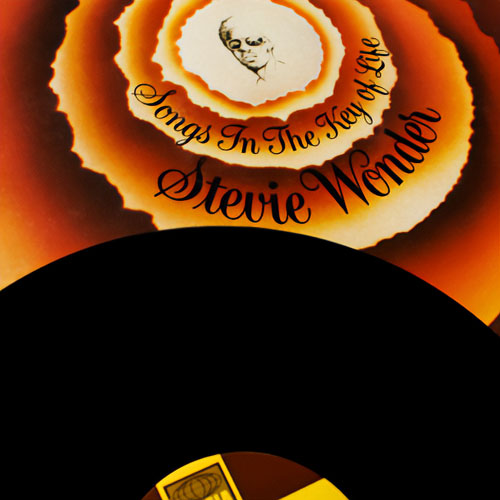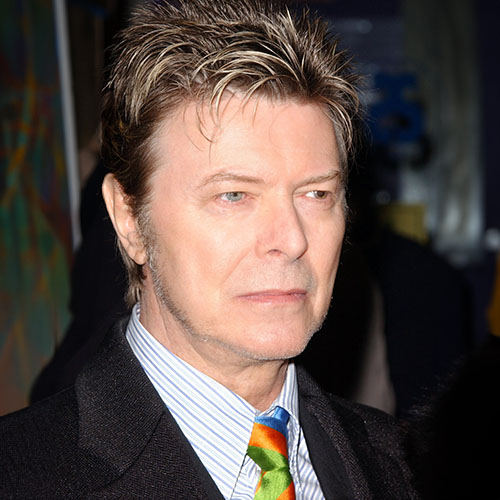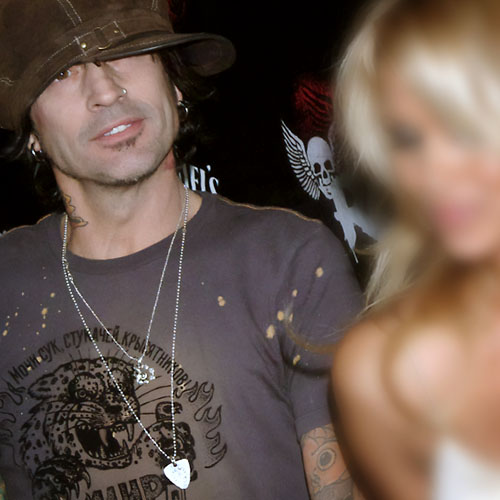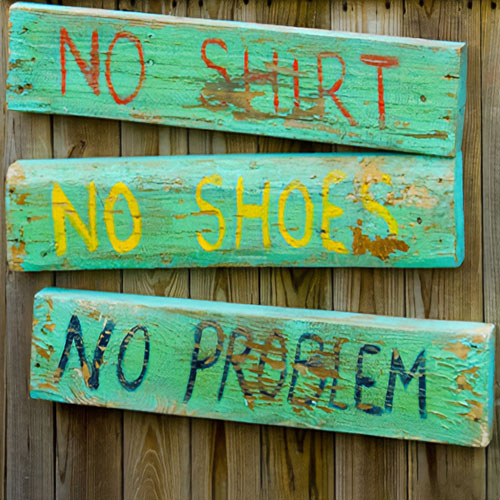Vince Gill has won Song of the Year a total of five times, making him the most-awarded artist in that category in CMA history. And he also has 22 Grammys. Take that, Garth.
Vince Gill: An Interview
If you look up nice guy in the dictionary, you might very well find a likeness of Vince Gill, the affable country star, ubiquitous charity-event coordinator, and perennial host of the Country Music Awards. But underneath it all,, Gill, 46, is far more complex, possessing a dry and sometimes sardonic sense of humor, a fierce temper, and a relentless drive for artistic greatness.
Lately he’s been especially lauded for the latter, owing to his splendid recent album, Next Big Thing. In comparison to his previous two albums — 2000’s Let’s Make Sure We Kiss Goodbye, a contemporary pop effort not well received by radio, and 1998’s The Key, a country nod to his childhood that reviewers loved but radio ignored — Next Big Thing is a winner all around. Stoked with potential hits that mine nearly all of country’s stylistic vaults, the CD also hearkens to a time when good writing was valued as much as commercial viability.
Even as Gill is enjoying a kind of second life with his music, he has also found a rebirth in his three-year marriage to Christian/pop singer Amy Grant, and in their daughter Corrina. For a time, the Gill-Grant romance was Nashville’s worst-kept secret; both were married — Gill to Sweethearts of the Rodeo’s Janis Gill, with whom he has a daughter, and Grant to Christian performer/talk-show host Gary Chapman, with whom she has three children. Tongues clucked, but in the end the newlyweds won over their critics, and Gill, always a reluctant sex symbol, had more panache than ever.
“I was not the kind of kid that stood in front of the mirror and pretended to be Elvis… I didn’t want to be a singer star. I didn’t even sing for a long time. I played guitar for years before I ever got up the nerve to start singing.”
Still, the six-foot-three classically handsome Gill — who became a superstar when his 1992 album I Still Believe in You sold more than five million copies — always downplayed his looks in favor of musicality. “With some of these other guys, all the widows show up and throw them their underwear,” he says, joking. “For me, they want to make me cookies.” Protests aside, he admits that one song off the latest album, “From Where I Stand,” about a test of marital fidelity, “gets the hairy eyeball from Amy.”
Gill talked about all this and more in Las Vegas recently, while he indulged in the kind of high-protein breakfast (bacon and eggs, hold the toast) that’s recently allowed him to lose 35 pounds.
You’ve been away from recording for an extended period of time. What brought you back into the studio?
Well, the last album only had a couple of singles on it, and only one, “Feels Like Love,” did pretty good. If there had been more singles, it probably wouldn’t have given the appearance that I had left the planet for three years. And there was no rush. Corrina is two, and I’m loving being around and enjoying this stretch of life. I also wanted to have a great collection of songs. And I wound up producing this record by myself more by default than by design and desire. After [longtime producer] Tony [Brown] left the label, I thought, Shoot, I think I’ll just try to do it by myself and see if I’ve learned anything these last 25 years. And after it was finished, it was kind of a new birth for me. I had a sense of pride that was new and unique for me.
This album is a lot more self-reflective — more Vince Gill — than your others.
I’m 46. I’d better start reflecting [laughs]. But this record is all over the map stylistically. I’m very proud of the last two records I made, but they were very pointed. When I made The Key, I just longed so much for those feels and those sounds that I knew as a kid. I would say, “God, my dad’s gone, and we used to listen to Patsy Cline, and all these records.” I wanted to hear stuff like that, because there wasn’t any of it on the radio. I knew going in it didn’t have a bunch of hits, but I wrote some neat songs that meant something to me, and I made my most critically acclaimed record. The next one [Let’s Make Sure We Kiss Goodbye], I said, “Well, they weren’t real crazy about a country record, so I’m going to sit much more on the contemporary side of things, with no fiddles and no steel guitars.” But it didn’t translate into anything that anybody wanted to play too much. So when it was time to go make a new record again, I said, “Let’s just flush all of that out and go be what you like to be.” And that’s all over the place, because I like Sonny Landreth as much as I do Sonny Osborne.
Some of the songs on Next Big Thing sound as if they were born out of your divorce and remarriage.
It’s difficult to say two years later what a song was about. Some of them I do [know], but the others were like we went and had a cheeseburger and came back and started writing songs. You just tell stories, you know.
Yet I’ve heard you say that “She Never Makes Me Cry” was inspired by a line from the recent Ocean’s Eleven.
Well, that’s important, because it’s not a mean lyric, but it’s sure not nice to the woman. I don’t want people to assume that’s about my past, because it just isn’t. But lyrically this record is much edgier than anything I’ve done before. To think I would ever say, “Does she make you beg for your love in the night?” — I mean, that’s pretty steamy. But I just wasn’t quite as afraid to say some things this time. I don’t know if it is because society is changing or I am.
It might be the first time that the word bitch is used in a country song.
Perhaps. But the way it’s said, it’s like, “bitchin’ and moanin’.” That’s not as harsh as “you son of a bitch.”
In the three years since these albums, Nashville has changed a lot — the labels are mostly corporate conglomerates now, sales have leveled, and there’s a huge emphasis on youthful pop acts masquerading as country performers. How do you see yourself fitting in or adapting to these events?
Well, the conglomerates, that’s happening to everybody, even the farmers. It’s just the way society has gone. In country music, everybody jumped on the bandwagon a few years ago, so you had all these new record companies, new publishing companies, and a million more artists. Still, you can only play so many records on the radio. It just had to weed itself out. And everybody is more cautious now. As to all the young acts, it’s just life and how it evolves. It’s time for the next 20-year-old kid. That’s the way the business works.
So Vince Gill would not one of those guys who says, “Everything was a lot better in the old days”?
The fact is, there were a lot of great records made in the old days, and there were a lot of lousy records made in the old days too.
I heard someone ask you a question about Shania Twain’s music, which a lot of critics believe put an end to country music as we once knew it. You were very tactful in saying that it’s true she isn’t a storyteller, but you went on to defend her contribution.
Yeah, because I think it’s valid. Do I think her music can stand up to a Guy Clark song like “The Randall Knife”? No, not a chance. But I think her ballads are pretty stellar. And a lot of young kids like the up-tempo stuff. So I don’t begrudge her, and I don’t look down my nose at her, because her songs are unlike anybody else’s, and she and Mutt [Lange, her husband and producer] make a great combination. I don’t have all of those records in my CD player, but I certainly respect the craft that they have between them to do what they do.
You have on this album a tribute to Merle Haggard, “Real Mean Bottle.” How did that song come about?
I did a kind of tribute to Chet Atkins on the radio with Bill Anderson and [Nashville session guitarist] Harold Bradley, and afterwards we started talking. Harold said, “I did one session with Hank Williams Sr., and I went up to Hank and said, ‘That was sure a great song, but it’s the saddest thing I ever heard in my whole life.’” And Hank said, “Well, son, it was a real mean bottle that wrote that song.” I thought, Man, what a great idea for a song title! It also reminded me of [Haggard’s] “The Bottle Let Me Down,” and then I had this whole idea to use Merle’s intro. I just wanted him to know how much he’s loved.
Where do you come down on the side of downloading music?
I think technology has done as much to damage our industry and our business as it has to help it. People don’t understand who they’re taking money from when they download music for nothing. They’re taking money away from the artist, but also from the songwriter. That’s their only source of income. Being a songwriter myself, I’m in the camp for people who make their living that way. Because it’s just a different animal than home taping. This has millions and millions of potential losses of people’s income. It’s just wrong, period.
You have a fairly new marriage, which a lot of people think revitalized you creatively. Do you remember when you realized you were really in love with Amy?
The first time I met her. You could ask any guy that ever met Amy, and they’d go, “Wow!” She just makes an impact on you, period, regardless of what your situation might be. I mean, she talks straight to you…. She’s just all in, and nothing distracts her. It doesn’t matter if you are a ditch digger or the president.
How did you two end up together, both being married at the time?
We knew each other for a few years. I had charity things and basketball that [Amy and Gary] would play at. And it just happened. It was pretty much a mutual kind of thing, that connection.
Did you say, “Oh my God”?
Yeah, sure. But I didn’t say, “Oh my God, what am I going to do?” I just said, “Oh my God, what a neat human being.” I wrote “Whenever You Come Around” subliminally about Amy. It was right after I met her. We did a Christmas thing together, and I was just really taken with her.
I think most people wanted to see the Gill/Grant relationship work. They thought that you should be together.
Everybody’s better off, you know. Not everybody was supportive, that’s for sure. But most were. And I think that is a tribute to how Amy has treated people in her life and her career, and hopefully me as well. Amy said it so eloquently. She said, “Having faith in God is not about being right. If we did everything right, we wouldn’t need a savior.”
You look really right together.
Yeah, it’s neat. The same coloring. And my middle name is Grant. When we got married, everybody thought I was being so European in taking her name. But there are all kinds of neat parallels.
What has she meant to you?
It’s just the neatest feeling at the end of a day to feel total peace. That’s what that companionship has brought.
One of your closest friends told me that you were just so miserable before you found her, and that the difference in you is remarkable.
But I didn’t consciously know that. You get embroiled in what’s normal for you, and then it’s a lot harder to spot. And I don’t really want to paint my past as so awful. I don’t know that it was. I do know that I felt alone through most of it, but it could just as easily have been my fault as anyone’s fault. Since I got a divorce, I haven’t said one word about being a victim. And I won’t.
Let’s talk about fatherhood the second time around. You’ve said, “This child saved my life.”
Well, she kind of saved everybody’s life, in the sense that she is the one thing that gives all of us something in common. To Amy’s kids, I’m just the guy who married their mom. And [my daughter] Jenny is not a blood relative of theirs. So Corrina gives all of the other kids a sister, and she gives Amy and me something that is ours.
Mr. Vince Gill recently received the 2003 PGA Distinguished Service Award, which puts you in the company of Jack Nicklaus, George Bush Sr., and Arnold Palmer. You got this for your annual golf invitational. But everyone says you could have been a professional golfer — that you’re that good.
Not really. I have reservations about how well I would have done. I started playing golf at seven to emulate my dad. I had as many athletic aspirations as I did music ones. I loved playing golf. And I was pretty good in basketball, but I was too short. I was the littlest kid in high school until I was about a senior. And I was not the kind of kid that stood in front of the mirror with a hairbrush and pretended to be Elvis, you know. I was the guy who had a guitar and buried his face in it and tried to learn what Chet Atkins played. I just wanted to be one of those guys that could really play, and play on records. I didn’t want to be a singing star. I didn’t even sing for a long time. I played guitar for years before I ever got up the nerve to start singing.
You’re sort of Nashville’s Bob Hope, what with hosting the Country Music Association awards show 12 times.
I don’t want to call myself that. All I’m hoping is that people like me like that. My greatest fear is that I’ll walk out there and people will start rolling their eyes, like, “Oh great, not him again!”
Do you worry about that?
The worst thing I could do is screw up? I’ve done it plenty before, and I’m going to do it plenty in the future, so no big deal.
It’s cool to see you be that loose.
It’s fun, but you can get in a lot of trouble. Just ask Natalie Maines [of the Dixie Chicks, who was much criticized by fans and in the press after speaking out onstage against President Bush shortly after the war in Iraq began].
You’ve spoken up in defense of the Chicks, in print and on the ACM show.
Well, not in defense of them, because you know, I hold the opposite view [of the war] completely and don’t agree with them. I also think that if you weigh in on something like that, it’s a no-win situation. But come on, enough’s enough.
You usually don’t get very political.
It didn’t have anything to do with politics. I’m not a confrontational, edgy human being, so I don’t fancy myself taking any stance. I’ve always been real pragmatic, trying to see both sides of a coin and be diplomatic and kind. I’m not out there to spout my views, because there will be ramifications for doing it. Yet everybody’s entitled, and that’s fair. What’s bizarre to me is, here’s this young girl who just kind of smarted off and said something obnoxious. So okay, if you don’t want to buy her records, don’t buy her records. But get over it and move on. The whole place booed at the CMT [Country Music Television] Awards and the ACM Awards, and I was shocked — just amazed at the magnitude of the reaction. You can watch cable news on any given night and hear countless people say worse things about our president than [what she said, which was that she was ashamed to be from the same state as Bush]. You can see people hold up a sign that compares him to Hitler, and on and on. And here everybody latches on to some smart-aleck statement. I totally concur with somebody if they want to hold the opposite view and say, “Hey, I’m not buying their records again,” or, “I’m not going to watch Susan Sarandon’s movies or buy Sean Penn’s video anymore.” But as I said at the ACMs, when you forgive, you bless yourself.
You grew up in Oklahoma, which has produced many of country’s biggest stars: Garth Brooks, Reba McEntire, Toby Keith, for starters. But you don’t talk about those years much.
[My childhood was] about as normal as you could ever imagine. Big brother, big sister. Dad was a lawyer. Came home every night at 5:30. I played on all of the school teams and never got into any trouble. Just a middle-class kind of neighborhood, public schools, and lots of friends. All the other kids loved my mom because she was like everybody’s second mother. So it was really a great environment. My mom and dad both grew up on farms and knew hard times, and they drilled it into me that the decisions I made better make sense. It didn’t have anything to do with my being a great student. They just said, “Whatever you do, it better make sense, or we’re going to bust you for it.” And boy, that was fair.
You talked about your father onstage last night. You described him as weighing 300 pounds and wearing overalls without a shirt, and being a combination of John Wayne, George Patton, and Donald Rumsfeld as Clint Eastwood.
Well, I was kind of grandstanding, trying to make people laugh, and overblowing it some, but it’s true. He was a taskmaster. Donald Rumsfeld reminds me of Clint Eastwood. I don’t think either one of them is so much like my dad, but he was a gruff bird. Made you toe the line, and you got whippings if you didn’t do right. So he was tough but fair, with a wicked sense of humor. And he also was a very educated man, a great lawyer and a federal appellate-court judge.
His death really changed me. It makes a guy grow up, to lose his dad.
Your mother had been married before, and had a son, Bob Coen, whose death inspired your song “Go Rest High on That Mountain.”
Yeah, I had no idea that song would make the impact it did on people’s lives. He was a great big brother. He was 12 years older than I was, and he played the guitar a little bit. He was always there to chord along for me while I practiced songs: “Six Pack to Go,” “Long, Tall Texan.”
At 22 he had a car wreck, going 100 miles an hour.
At least.
Drinking?
Yeah.
He was in a coma, not expected to live, but came out of it and was almost 100 percent normal.
Yeah, the percentage of that would be debatable, but they say that only five percent of head-injured patients that are in a coma more than a few days ever regain all of their faculties. He would just forget simple things, and that kept him from holding a job for very long. He wound up spending the rest of his life traveling. He’d be gone for a few years, and then come home and disappear, and Mom would find him down working at the mission or on the Salvation Army truck. A heart attack actually killed him [in 1993].
You were ten when he had his accident. Did some of your compassion and caring come from watching your brother?
He was that way. Mom says he was always loving on us, diapering us kids. We were running buddies. When he was in college, he would take me up there and hustle people. “My little brother can beat you at pool.” “He cannot.” “I’ll bet you a beer.” And I would go beat’em and he would have his beer. He was neat. And really smart. He had a great grasp of theology. And he never bitched.
You also have a sister, Gina. What does she do?
Right now she works for a bail bondsman. She and my mom both, for a good while, were writing bonds and getting guys out of jail and stuff. They saw a real interesting side of life. They’re both tough as nails. I’m the wimp of the family, I guarantee you. My sister and I were really close too. She was two and a half years older, so she was my protector. She just throttled people.
Was Vince Gill good at school?
Just average. Oklahoma City was one of the first places to start forced busing. It was intense, with a lot of fights in the hall and riots. But I never had a prejudiced bone in my body. I remember a black kid named Larry Stephenson in the seventh grade. We just adored each other. We were fascinated with each other’s hair. He would say, “I’ve never seen anything like that.” He’d play with my straight hair, and I would play with his Afro. And I had a black teacher that year who I thought was the most beautiful woman I had ever seen in my life. She was real young, probably early twenties, and just gorgeous. Her name was Miss Sledge. She took Natalie Wood off the map. But she broke my heart. I did some sort of report on the busing problems, and I used the term colored, and she just ripped my head off. I was crushed. I was brought up to think it was a respectful term.
You left home to play bluegrass music in Kentucky Then you went out to Los Angeles, where you joined Pure Prairie League for a while, before meeting Rodney Crowell and Rosanne Cash and becoming Cash’s guitar player. What do you remember best about that era?
It was the most musical time of my life. Rodney and Rose shared the same band pretty much, and the fact that I was accepted and respected by the people I respected the most was an amazing feeling for me as a musician. I looked up to Rodney so much. Rod or Rose weren’t really players, but I was a player and I could sing and do all the parts. So I had a good role that I was comfortable in, and then I waded my way into writing songs.
If you look at that group of people, you are the one who really sustained a commercial career.
Yeah, but even in my best of times, there was always somebody selling a boatload more records and having more success. So I’ve always felt like I was right in there, but not the big mack daddy, you know?
And yet you are so respected by your peers in other kinds of music that in 1989 Mark Knopfler asked you to join Dire Straits. You declined right before “When I Call Your Name” came out as a single. That song changed everything for you.
It really was life-changing. It’s had the biggest impact, and for me, it symbolizes the pride I have in how country it was. Because I do like being contemporary and turning my guitar up and playing really loud and obnoxious, but my reverence for this music is the most important thing. I’m more proud of some of these traditional songs than anybody will ever know, for a lot of reasons, like honoring my family. Roy Acuff just completely loved that song. Every time I played the Opry, he would go, “Well, you can’t leave until you sing my song,” and threaten to punch me in the nose if I didn’t. I have a picture of him listening to it. He was right in my face because he couldn’t see very far, and he had a big tear in his eye. That meant as much to me as it being a hit.
You did a duet with Barbra Streisand, “If You Ever Leave Me,” several years ago. What was that like?
Well, I was very paranoid to do it, period, because she is quite a diva. And really, I don’t think she knew my music. I think [the duet’s songwriter/producer] Richard Marx and [producer] David Foster, who asked me to do it, just talked to her and told her to let me do that. She was doing a record of love songs for her husband. So I went out there [to Los Angeles] very scared, but I did my part. And we waited for her to come hear it, and because she kept calling over a five- or six-hour period, saying she was going to be late, you know, my paranoia got prolonged even longer. Finally she got there to hear what I had done. They started playing the song, and I hadn’t even finished the first line when she reached over and hit David Foster and said [very fast-paced New York accent], “What did he say? What did he say? I couldn’t understand the words there. Could you understand the words?” David said, “Just listen.” And I’m thinking, I’m dead. She’s gonna come out here and rip me. But she sat and listened and kind of relaxed as it went along. I could see her ears perk up at certain things. And there was a long silence after it was over. Then she turned around, looked at me for a while, and finally she said [New York accent], “You’re pretty damned good. But I just have one question for you.” I said, “What’s that?” She said, “Why do you say the word muh?” And I said, “What are you talking about?” She said, “You say the word muh when you sing. It’s ‘muh’ this and ‘muh’ that. The word is my. Why don’t you sing the word my?”
I said, “Well, that’s the way muh mama and muh daddy taught me to say it.”
She was a trip. She posed everything to me as a question, which puts you on the defensive. But I think there are people who just communicate like that. She’s really asking because maybe she doesn’t know, you know. Then I had to do that video with her, and I’m the most non-video guy who ever lived, because I don’t ever want to do them. And of course in this thing she’s touching me and all of this stuff, and I’m, like, stiff as a board. And of course I’m six-foot-a-million, and she’s five-foot-nothing, so they had to put her up on an apple box. But you know what? The truth is, once I got past being scared, it got kind of fun. I’m just a massive fan of her voice, and she may be whatever to other folks, but she was nothing but kind to me.
Rodney Crowell told me that beneath your sort of “aw, shucks” charm, he always knew that you wore a mask, that there was this real desire to succeed. He also calls you a wounded child. Is that where those searing ballads of yours come from?
It would take eons of therapy to figure out where all of this comes from, but I know there is a deep melancholy sadness that draws me so much to that side of music and life. I don’t know what it is. I was just always drawn to it. But Rodney is pretty right on about the mask and whatnot. Everybody finds their way to protect themselves, you know, and mine is through self-deprecation and jokes. I don’t think that it’s a false quality. It’s just part of my makeup. And I probably had an expectation that was a little past the point of reality. I’ve really been excruciatingly hard on myself.
You’ve got this calm exterior, but there’s a very intense guy under there.
Well, yeah, there’s some serious rage issues. I have a bad temper.
It’s getting to be sort of legendary.
I think a lot of soft-spoken people have it, though. And it’s directed only at myself, for the most part.
What would set you off?
I got mad today because I was trying to do this guitar part in a session, and I just couldn’t do it. I was livid.
How does the mature Vince Gill deal with that kind of anger?
I was smart enough to quit [laughs]. I said, “Hey guys, I’m going home.” I wish I didn’t have that temper. Amy was the first person who had anything positive to say about it. Years ago we played golf with her managers, Mike and Dan. And halfway through the round, things didn’t go so good, and I broke a club. And she went, “Wow, that’s really interesting. I didn’t know you had a temper, but it makes sense that you do, and that you can’t control it.” I said, “What do you mean?” She said, “You’re the kind of person who cries when something moves you, and laughs from your toes when something strikes you funny.” She said, “Your emotions are very accessible. I don’t know how you could expect to be able to control that one if you can’t control any of them.” And it was the first thing anybody ever said to me that was really helpful. Then I played golf with a sports psychologist who works with a bunch of the tour players. I said, “Well, I know you’ve heard all of the stories. What do you think?” And he said, “You live in a world that probably needs a dose of reality. I think it’s okay for you to slide out in the woods and yell once in a while, or break a club if you can’t let that out when you work.” He said, “That’s why you are successful, because you have that fire in your belly.” And I don’t whirly-bird near as many as I used to. But it just completely blows people away when they see it. They go, “Huh?”
Do you sort of resent your Mr. Nice Guy image?
I don’t resent it at all. I kind of tease myself and say I do so many good things to compensate for being such a butthead on the golf course.
A lot of people think you aren’t encumbered by a great deal of angst as an artist, which has helped you stay focused in your career. Do you think that’s true?
Uh, probably. I don’t have tons of depth as a thinker. I think I am wise, but I am not a man of a lot of words.
You’ve won about every award but an Oscar and a Tony What else do you want to do?
Oh, gosh. If you had asked me 25 or 30 years ago what I’d like to happen, I wouldn’t have dreamed any of this. It’s just insane. I live in the moment, so setting goals would be laughable for me. I like answering the phone, because you never know who it’s going to be. That’s the fun thing.
Mr. Gill remains a big favorite for at least one of our team who spent some time with the band at a gig in Los Angeles. Now we cannot verify that Vince actually qualifies as one of the nicest people in the ranks of the famous, but we can say that if it does not tug at your heart when you hear him sing, “When I Call Your Name,” then you are dead inside. … Naturally you can visit him online to find out where you can go see for yourself. It don’t rock much, but it shore is purty.







